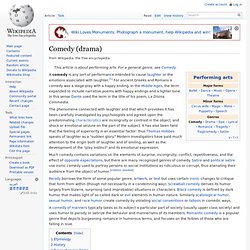

Comedy: Evolution of Comedy. Comedy (drama) This article is about performing arts.

For a general genre, see Comedy. A comedy is any sort of performance intended to cause laughter or the emotions associated with laughter.[1] For ancient Greeks and Romans a comedy was a stage-play with a happy ending. In the Middle Ages, the term expanded to include narrative poems with happy endings and a lighter tone. In this sense Dante used the term in the title of his poem, La Divina Commedia. The phenomena connected with laughter and that which provokes it has been carefully investigated by psychologists and agreed upon the predominating characteristics are incongruity or contrast in the object, and shock or emotional seizure on the part of the subject.
Much comedy contains variations on the elements of surprise, incongruity, conflict, repetitiveness, and the effect of opposite expectations, but there are many recognized genres of comedy. Ancient Greek Theater: Satyr Plays as the First Comedy. Modern movies such as The Hangover, 40 Year Old Virgin, and American Pie owe a great deal to the Greeks.

Why? Because playwrights invented the ever-popular but always controversial genre known as "the sex comedy. " Of course, that's not what they were called during the days of Ancient Greece. Instead, they were known as satyr plays. During the Festival of Dionysus, audiences would sit and watch three tragedies in a row. Although many Satyr plays are mentioned by Greek historians, only one complete script remains: Cyclops. is an adventurous comedy by Euripides.
But for the most part, these satyr plays were briefer than a regular drama. Written during the Peloponnesian War - a conflict Aristophanes felt was a pointless waste of human life, this comedy begins with the heroine, Lysistrata, explaining to her fellow women how to prevent their husbands from going off to battle: In short, they withhold sex from their husbands until the men submit to their wives and call of their ongoing battle.
Origin of Comedy. The evolution of comedy is much simpler than that of its sister art, though as to its origin and earlier development there is little exact information.

All that Aristotle can tell us is that it first took shape in Megaris and Sicyon, whose people were noted for their coarse humor and sense of the ludicrous, while Susarion, the earliest comic poet, was a native of a Megarian town. Add to this that it arose from the Phallic processions of the Greeks, as did tragedy from the dithyramb, and we have about all that is known as to the inception of the lighter branch of the drama. At country festivals held in celebration of the vintage it was the custom for people to pass from village to village, some in carts, uttering the vile jests and abuse unjustly attributed to the tragic choruses; others on foot, bearing aloft the Phallic emblem and singing the praises of Phales, the comrade of Bacchus.
Purchase Books on Greek Comedy Search eBay! Dramatic Comedy: History and Types Video - Lesson and Example. A Happy Ending I want to start this video out with a little test.

I'm going to make a statement. You see how you react. The only thing the main character in a dramatic comedy needs is a happy ending. If you didn't laugh, good for you! If you did snicker, even if to yourself, then you probably need to get your head out of the gutter, even though you are well on your way to understanding ancient Greek dramatic comedy. Origin and Definitions While historians aren't exactly sure about the origins of dramatic comedy, it is probable that it's linked to ancient bawdy plays where men dressed up as satyrs - half-man, half-goat beasts - to get drunk, sing, and entertain the crowd with their sexual innuendos.
Now, that's just plain silly. But this probably isn't too surprising, given that much of today's dramatic comedy on television and film utilizes sexual undertones (or blatant sexual references) to enhance the comedic effect.